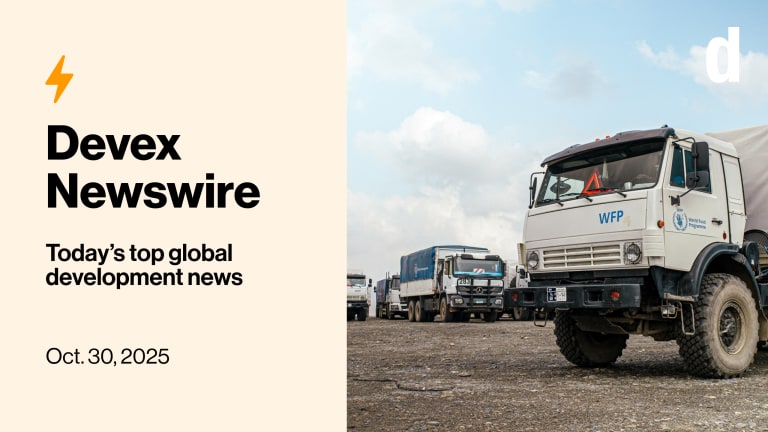
More than 3 million in less than 3 weeks. That’s the tally of the refugees fleeing Ukraine, according to the UN Refugee Agency, and strains are beginning to show in neighboring countries as they tackle the herculean task of caring for so many people fleeing violence.
This is a preview of Newswire
Sign up to this newsletter for an inside look at the biggest stories in global development, in your inbox daily.
Aid groups have to navigate carefully and be judicious as they decide on their entry into the situation, which is only expected to worsen.
Teresa Welsh digs into what exactly aid organizations are considering as they set up operations in and around Ukraine. “Is there something we can do as an organization?” is a key question being asked right now. For many staffers, it’s their first time operating in Europe — and the situation is markedly different from what aid groups have encountered elsewhere.
On the one hand, refugees are not being piled into camps, as they either find accommodations on their own or are being housed by locals as part of the host countries’ efforts to help people who are displaced. But, aid groups say, the downside is that doing needs assessments is harder. “They’re not just literally sitting there ready to answer your questions,” an aid worker tells Teresa.
However, as more people flee, this may change. The sheer number of people fleeing is becoming overwhelming for existing efforts across the several countries hosting Ukrainians. In Romania’s Bucharest, for example, authorities were converting a convention center and indoor arena into a shelter.
MercyCorps, one of the groups diving into action, is focused on partnering with local organizations, including through direct cash support at the border areas. Operating inside the country is more difficult, and the need for partners is especially acute. Many local organizations have better access to hard-hit areas that are being shelled right now, including the cities of Kharkiv and Mariupol.
The bottom line Teresa is hearing: It’s essential to make sure to do more than plant a flag. Rather, aid workers are trying to focus on what added value any group can bring to the dire situation.
Devex Pro: How international NGOs are setting up a Ukraine response from scratch
+ Catch up on all our coverage of the humanitarian response to the war in Ukraine.
Off a cliff
That Ukraine will enter into a “deep recession“ is not a surprise, but the expected economic decline is still shocking. IMF staff report estimates “a deterioration in the growth outlook of at least 13.5 percentage points” for the year. Even that number could be optimistic, as it is based around a quick end to the war and full and sustained donor support for the recovery. The staff report notes that other war-hit economies have seen annual economic contractions of up to 35%.
The World Bank, meanwhile, announced it would be releasing $200 million in financing to “bolster Ukraine’s social services for vulnerable people.” With the latest announcement, over the last two weeks the bank has made available more than $925 million in various relief mechanisms to the country in crisis.
ICYMI: Ukraine says war damage exceeds $100B, warns of food crisis
No hoard feelings
Food price spikes are going to hit low- and middle-income countries and poor people in high-income countries hardest, according to World Bank President David Malpass. He expressed frustration with governments that have curtailed food exports, saying the move “is not a proper response … for a global community and a global response to a crisis.” Speaking Monday at an event hosted by the Washington Post, Malpass noted that the 2008 food crisis was exacerbated by hoarding.
The World Bank chief also did not mince words, blaming Russia squarely for the war in Ukraine and the rippling effects.
Designation: Starvation
Will the U.K. list Yemen’s Houthi rebels as a terrorist organization? My colleague Will Worley’s sources tell him there is pressure on London to do so from the United Arab Emirates — which could be using its oil resources amid Britain’s domestic energy crisis as leverage. Such a designation would likely have drastic humanitarian consequences for Yemen, where 17 million people are already food insecure.
“No food coming in rapidly turns into mass starvation in the circumstances Yemen faces,” former U.N. aid chief Mark Lowcock tells Will. This all comes on top of the British government cutting its aid budget to Yemen by nearly 60% last year.
The debate matches a similar one taking place on the other side of the Atlantic, as the Biden administration also weighs the designation — and aid groups, fearing a catastrophe, strive to prevent the step. The move would be a flip-flop after the current White House reversed a Trump-era designation of the Houthis.
Read: UK mulls blacklisting Houthis as humanitarians predict fallout
More on Yemen: The country’s health system is in a state of collapse with about half the health facilities nonfunctional and even the functioning half only operational to varying degrees.
Hear hear
Dr. John Nkengasong — U.S. President Biden’s pick to lead the U.S. President's Emergency Plan for AIDS Relief — will have his nomination hearing today in the Senate, which you can watch in full. The founding director of the Africa Centres for Disease Control and Prevention is expected to be confirmed, which would make him the first person of African origin to lead the agency.
The appointment comes at a critical time for PEPFAR as policymakers consider ways to leverage its institutional structure to tackle broader health challenges.
Dr. John Nkengasong: An in-depth Devex profile.
+ Devex Pro subscribers can access our monthly roundup of who’s who in globaldev. Not gone Pro yet? Get started today by signing up to a 15-day free trial.
In other news
China is locking down major cities as it battles its largest COVID-19 surge yet. [Financial Times]
A measles outbreak in Afghanistan has claimed the lives of 142 children and infected 18,000 since the start of the year, according to the World Health Organization. [Voice of America]
Russia has temporarily banned grain exports to ex-Soviet countries, along with most sugar exports, at least through most of the summer months. [Reuters]
Sign up to Newswire for an inside look at the biggest stories in global development.








